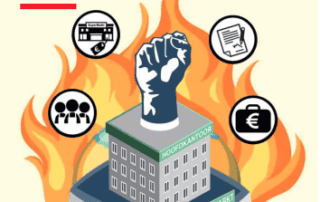Franchisor liable for incorrect forecast to franchisee, tort
Once again, a judicial body has recently ruled on the in franchise relations with some regularity, prognostic problems, in this case the Court of Appeal of ‘s-Hertogenbosch, LJN:BZ 4057.
Facts:
Briefly, the issue underlying the ruling boiled down to the following. The franchisor in question offered one of its branches for acquisition to potential franchisees. In the end, an acquisition agreement and a franchise agreement were reached with a franchisee. A market research agency commissioned by the franchisor has drawn up a report for that franchisee for the franchisee’s financing application, which includes an assessment of future returns and cash flow developments. The report therefore also included a turnover and result forecast. The agency involved advised positively on the takeover.
Initially, it came to a takeover and a “service agreement” between the parties. However, soon after the start it became apparent that the predicted returns were far from being achieved. A few years later, an actual franchise agreement was finally reached. However, this did not lead to any improvement, after which, after two years, the franchise agreement was terminated in joint consultation and the franchisee finally ceased his business.
Procedure:
In the proceedings, the franchisee takes the position that it has received incorrect, incomplete and misleading information from the franchisor, or at least its auxiliary person, being the research agency, with regard to the operation of the establishment in question. The franchisee expressed the presumption that the branch was only sold to him because the franchisor could not make it profitable, which was actually apparent from, among other things, the results of that branch prior to the takeover. The profit margins also turned out to be considerably lower than forecast. In this context, the franchisee primarily took the position that it could reasonably expect results as forecast and that the franchisor had failed in its obligation to live up to that expectation. In the alternative, the franchisee took the position that providing incorrect, misleading and/or incomplete information in this way should be qualified as an unlawful act.
The franchisor defended itself primarily by stating that it had not issued any forecasts, but that the research bureau had done so. It further stated that the report of that research agency expressly stated that those forecasts were no guarantee of success and that de facto entrepreneurship was decisive. The franchisor also took the position that, now that the franchisee had opened a second store, the lagging results could be partly attributed to this.
Judgement:
The Court of Appeal ruled that there is no question of a guarantee obligation on the part of the franchisor and that, by extension, there is no question of any attributable shortcoming. What is special, however, is that the Court of Appeal does rule that the franchisor has acted unlawfully towards the franchisee by providing the research agency with incorrect information about its own operation of the store, or by failing to inform the franchisor of inaccuracies in the report drawn up by the research agency. ways. The court appears to be of the opinion that the inaccuracies in question must be regarded as serious errors in the reporting. The Court of Appeal strongly blames the franchisor that it itself operated the establishment in question before the takeover, and therefore knew the actual figures of that establishment very well. Under those circumstances, the franchisee was entitled to assume, according to the court, that the forecasts presented to him would be based on a proper analysis of data known to the franchisor from, among other things, other affiliated entrepreneurs, which was therefore not the case in this case. to be. In the view of the Court of Appeal, the causal link is also established, now that the franchisee has argued that he would not have received financing if he had been correctly informed prior to the conclusion of the agreement, and the takeover would therefore not have come about. . In the view of the court, this reasoning also extends to the conclusion of the franchise agreement itself. The defenses of the franchisor in question were of no avail in that context. In particular, the franchisor has not been able to demonstrate sufficiently that the disappointing results were due to insufficient entrepreneurship on the part of the franchisee.
The Court finds that the franchisor is liable for compensation in this case and refers the matter in that context to a damage assessment procedure.
Commentary:
In itself, more judgments are known in which franchisors are ordered to pay damages in connection with incorrect forecasts. However, this ruling is remarkable, because the Court of Appeal qualifies this as an unlawful act in this case. Naturally, this also has to do with the factual background to the matter, which includes, among other things, the fact that the franchisor operated the establishment itself and must therefore have been aware of the actual operating results, as well as the considerable discrepancy that existed between the research agency presented forecasts and those results. However, this does show that, especially when it comes to existing branches, extreme care must be taken with the provision of pre-contractual information and the preparation of forecasts for the benefit of (potential) franchisees. Tort is an extra-contractual form of liability, which the Court of Appeal therefore bases entirely on what happened prior to the conclusion of the contract, when there was no agreement yet. In any case, this may open the way even more than before to compensation for victimized franchisees on the basis of inaccuracies in the run-up to a franchise agreement.
Mr DL van Dam – Franchise lawyer
Ludwig & Van Dam Franchise attorneys,franchise legal advice. Do you want to respond? Mail to vandam@ludwigvandam.nl

Other messages
Hard or soft? That makes a difference!
Hard or soft? That makes a difference! In practice, ...
Post non-competition ban without a signed franchise agreement
Is a franchisee bound by a post-competition ban without ...
Post non-competition ban without a signed franchise agreement
Is a franchisee bound by a post-competition ban without a ...
Post non-compete clause in hard franchising
The summary proceedings judge of the Amsterdam District Court ...
Does an agreed rent indexation always apply?
Many entrepreneurs were confronted with a significant rent increase ...
Ludwig & Van Dam in Distrifood Magazine about the Franchise Act
Interview about the current obstacles for independent supermarket entrepreneurs and ...






